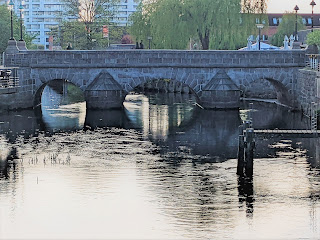Setting is as integral to a story as the
characters and plot. It can also be important to backstory. When I was
developing the backstory for Anna, the protagonist in The Legacy, I needed her to be from a location in Denmark that was just
north of the German-occupied area of South Jutland in 1874. Farming had to be a
major occupation in the area. I also wanted to be able to locate Anna’s family
home near a sizable city, where her brother could have been employed by a
brewery.
At the time I had not been to Denmark so I
looked at a map from the period and selected the city of Vejle. I researched
the area enough to know it fit my basic criteria. Now that I’ve visited the
city, I’ve learned that Vejle’s beauty and history make it a worthy main
character.
The city is situated in eastern Jutland.
Businesses and residences stand in river valleys and on the slopes of wooded
hills. Green trees provide a lovely backdrop for the numerous brick structures
and tiled roofs.
 |
| Photo by K.A. Knudsen |
Vejle’s name comes from an Old Danish word
meaning “ford,” because the city is located at the convergence of the Vejle and
Greis Rivers at the head of the Vejle Fjord. In Viking times, area wetlands had
to be crossed by the Ravning Bridge, a nearly half-mile wooden structure.
Remnants of the bridge which were discovered buried in the ground date back to
ca.890-985 AD. It is believed to have been built by Harold Bluetooth and his
people, but its purpose is uncertain. Archaeologists’ theories vary from the
bridge being built quickly for troop transport to more mundane purposes such as
allowing traders to transport wares over the swampy area.
 |
| Photo via Wiki Commons |
The first known recorded mention of the
city dates back to 1256, but archaeological digs in downtown Vejle have discovered
that there were homes in the area as far back as 1100. The current St. Nicolai
Church building, in the same downtown area, dates to the 13th
century. Dedicated to the patron saint of merchants and seafarers, the original
church was built in late Romanesque style. Renovations have occurred over the
centuries especially
after incurring serious damage during the Thirty Years War (1618-1848). Since
then there have been several major updates, the most recent being in the 1960s.
The church houses many artifacts, including the remains of the Haraldskær
Woman, one of the best preserved of the Iron Age bog bodies, on display in a glass-covered sarcophagus.
During the Middle Ages, Vejle was an
important market town. Through the 1500s and into the 1600s, the town experienced
prosperity and growth, benefiting from rising exports. Vejle continued to
develop along those lines up to the mid-17th century. In the late 17th and
early 18th centuries, the population decreased due to plague and war.
 |
| Photo is property of author |
The 1801 census showed that Vejle had
approximately 1,300 townspeople. In 1827, a new harbor was established on the
fjord, and in the latter part of the 19th century, a railroad
station and modern utilities set the town on the path to continued growth. Today,
the city’s population is approximately 59,000.
Although my selection was somewhat serendipitous, Vejle is a noble town near which to situate the fictional ancestral home of Anna and the other characters in the Stryker Legacy series.
Buy Links: Paperback at Amazon Amazon print or digital
.jpg)


Thanks for this fascinating account of the history and setting of Vejie. It does look attractive from your photos and sounds attractive and interesting from your blog. I agree with you about how vital setting can be in fiction.
ReplyDeleteThank you, Lindsay. It was fun to finally see the city I had read so much about.
DeleteWhat a beautiful place, and a perfect setting. It does surprise me how often we chose a place, and find that other parts of the story fall into place around that setting. I once set a proposed murder in a city, only to find that the unique in-depth scientific research and innovations in the area were exactly what I needed. There seems to be something creative people can draw on out there!
ReplyDeleteYes, sometimes it feels like the muse who inspired the story is helping details fall into place. Writing is so much fun when that happens.
DeleteSerendipity. What a place that sounds to be. Wow. Doris
ReplyDeleteThanks, Doris.
Delete